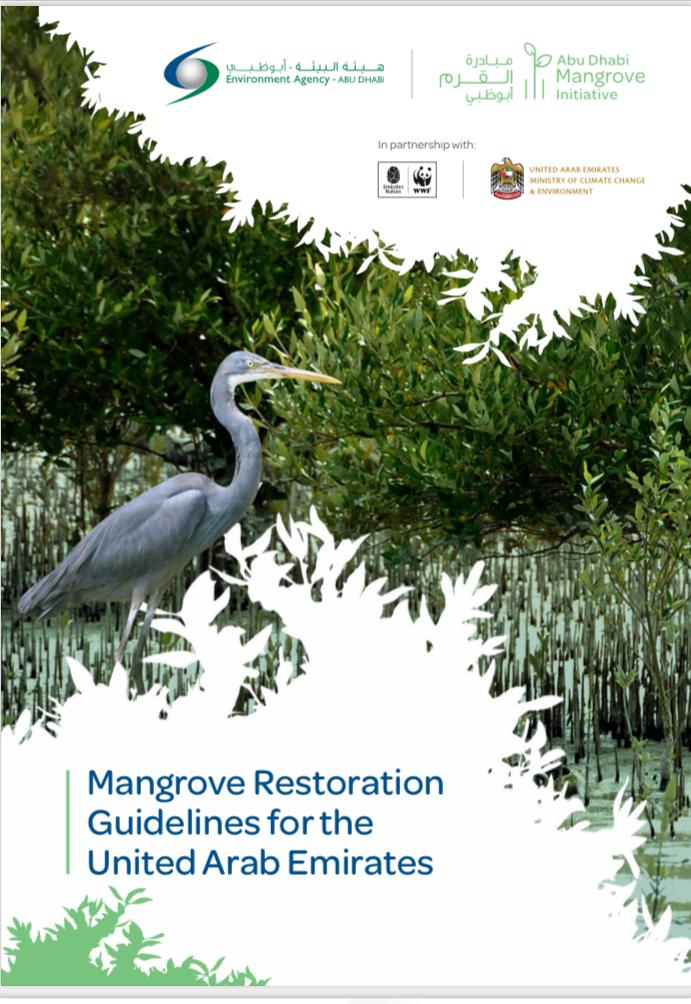
Abu Dhabi, 18th September, 2024: In line with Abu Dhabi Mangrove Initiative (ADMI), the Environment Agency – Abu Dhabi (EAD), in collaboration with the Ministry of Climate Change and Environment (MOCCAE) and Emirates Nature-WWF, launched a first-of-its-kind ‘Guidelines for Mangrove Restoration in the UAE’.
As the first national publication to provide specific guidance for mangrove restoration in the UAE, the Guidelines also cover the planning of a successful restoration project, considering the country’s unique mangrove ecosystems and environmental conditions.
The Guidelines aim to serve as a beacon for future restoration efforts in the UAE and around the world. The objective is to create a legacy document that will support future mangrove restoration initiatives, ensuring their long-term vitality and associated ecosystems on the local and international levels.
Her Excellency Dr. Shaikha Salem Al Dhaheri, Secretary General of EAD, on the occasion says: “In alignment with the Year of Sustainability, we honor the legacy of the late Sheikh Zayed bin Sultan Al Nahyan, the nation's Founding Father, whose pioneering mangrove restoration efforts have long established responsible stewardship of mangrove forests in the UAE. His passion for marine and coastal environments saw the first mangrove plantation project initiated in 1966 along Abu Dhabi’s coast – a clear demonstration of his vision and commitment to ecological preservation. Today, we also celebrate the launch of the ‘Guidelines for Mangrove Restoration in the UAE’, in partnership with the Ministry of Climate Change and Environment and Emirates Nature-WWF.”
Her Excellency added: “This comprehensive and detailed national practice guideline for mangrove restoration is the first publication to provide specific guidance tailored to the local context. It aims to consolidate the expertise and knowledge established in the UAE, providing guidelines that will benefit all mangrove restoration initiatives both within the UAE and the wider region. Our recommendations are aligned with global best practices. It will also help all our stakeholders to benefit from the technological innovations applied in the UAE to enhance restoration efforts.”
H.E. Dr. Mohammed Salman Al Hammadi, Assistant Undersecretary for Biodiversity and Marine Life Sector, and Acting Assistant Undersecretary for the Food Diversity Sector at MOCCAE said: “Our close cooperation with the Environment Agency – Abu Dhabi and Emirates Nature-WWF on the ‘Guidelines for Mangrove Restoration in the UAE’ reflects our joint commitment to preserving this key ecosystem. This guideline confirms the UAE’s recognition of mangroves as one of the most important nature-based solutions for climate action and helps achieve the country’s commitment to plant 100 million mangroves by 2030, which will significantly contribute to the UAE’s achievement of climate neutrality by 2050. The guide also aims to raise national capabilities and assist decision makers and field work teams in the proper management of mangrove rehabilitation operations and projects. The document was developed in accordance with a scientific methodology and clear guidelines that rely on a comprehensive technical assessment, developing appropriate solutions and methods for the rehabilitation of mangrove trees, and following up through periodic monitoring programmes.”
His Excellency added: “Conserving and restoring mangroves are complex processes and require strategies and scientific methodology, which makes the ‘Guidelines for Mangrove Restoration in the UAE’ crucial to enhancing mangrove cover locally. In line with global best practices, the guide provides advanced insights for undertaking restoration projects in the UAE to identify ways to maximise their economic, social and environmental benefits.”
His Excellency praised all national efforts and initiatives, whether they originated from the government or private sector or from civil society organisations, that have contributed to planting and preserving mangroves, in addition to raising community awareness of their importance – all of which supports the realisation of the national goal to plant 100 million mangrove trees by 2030.
Laila Abdullatif, Director General at Emirates Nature says: “Mangroves and other blue carbon ecosystems in the UAE are essential components to ensure the well-being of our people, the vibrancy of our biodiversity and the sanctity of our climate. This report serves as a north star for mangrove and ecosystem restoration across the region. I encourage the wider community to leverage these insights and utilise a science-driven approach to achieve effective conservation and lasting success.”
On an international level, the Guidelines support the Mangrove Breakthrough initiative – a joint effort by The Global Mangrove Alliance (GMA) in collaboration with the UN Climate Change High-level Champions and other partners – to accelerate global mangrove restoration. The Mangrove Breakthrough’s guiding principles and global target are restoring and protecting 15 million hectares of mangroves, as well as halting their destruction, by 2030. On a national level, the document will help accelerate the roadmap for the ‘National Carbon Sequestration Project’, which aims to plant 100 million mangroves by 2030 across the country.
